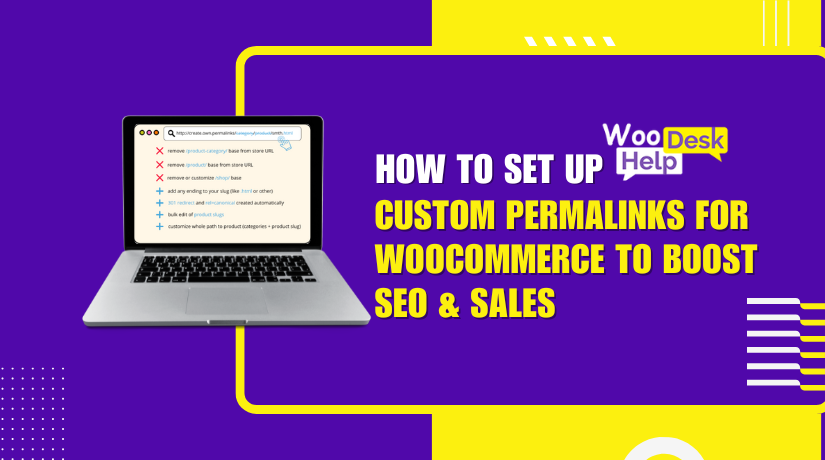
How to Set Up Custom Permalinks for WooCommerce to Boost SEO & Sales
Table of Contents
- What Are WooCommerce Permalinks?
- Why Customize Permalinks?
- Introducing the Plugin
- Key Features of Custom Permalinks for WooCommerce
- SEO Optimization Features
- Benefits for WooCommerce Store Owners
- Step-by-Step Setup & Configuration Process
- When Should You Use This Plugin?
- Practical Use Cases
- Avoiding Common Mistakes
- Conclusion
What Are WooCommerce Permalinks?
The permanent URLs for the information on your website are called permalinks. In WooCommerce, they are used for product pages, categories, and tags. By default, WooCommerce adds /product/ before each product URL and /product-category/ before each category. For example:
- yourstore.com/product/laptop-bag
- yourstore.com/product-category/accessories
These default URLs work fine, but they are not always ideal. They can be long, cluttered, and not optimized for SEO or users.
Why Customize Permalinks?
Customizing permalinks helps your store in many ways. It simplifies, shortens, and improves the readability of URLs. Additionally, it improves your website’s search engine ranking. Clean URLs often get higher click-through rates on Google.
For example:
- yourstore.com/laptop-bag looks better than yourstore.com/product/laptop-bag
- Shorter URLs load faster and are easier to share
- Including category names in the URL can improve search relevance
Additionally, custom URLs give your website a more polished appearance. Users’ trust is increased as a result. And if you moved your store from another platform, you may want to keep the same URLs. This prevents broken links and lost traffic.
Introducing the Plugin
This is precisely why the Custom Permalinks for WooCommerce plugin was created. It helps store owners take full control over their WooCommerce URLs. You can remove /product/ and /product-category/ easily. Additionally, you have the option to display category routes or just the product slug.
This plugin is great for:
- Shop owners who wish to improve their SEO
- Businesses migrating from another CMS
- Anyone who wants clean, user-friendly URLs
You can use it without knowing how to code. It works directly from your WooCommerce settings. Just install, choose your options, and save changes.
By using this plugin, you’re not only improving your site’s look but also boosting SEO. Customers will locate and trust your store more easily as a result.
Key Features of Custom Permalinks for WooCommerce
You have complete control over the URLs of your store thanks to this plugin. With just a few clicks, you can remove default paths like /product/ or /product-category/. This instantly makes your URLs look cleaner and more user-friendly.
Here’s a breakdown of its key features:
- Remove /product/ from product URLs
You can remove the /product/ base from your product links. This allows your product URLs to appear directly after your domain. Example:
- From yourstore.com/product/laptop-bag
- To yourstore.com/laptop-bag
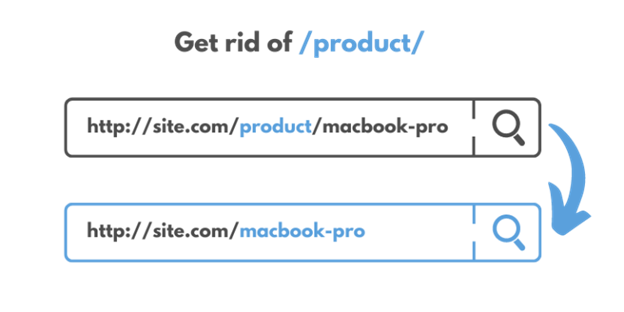
- Remove /product-category/ from category URLs
This feature helps you create clean category links. Example:
- From yourstore.com/product-category/backpacks
- To yourstore.com/backpacks
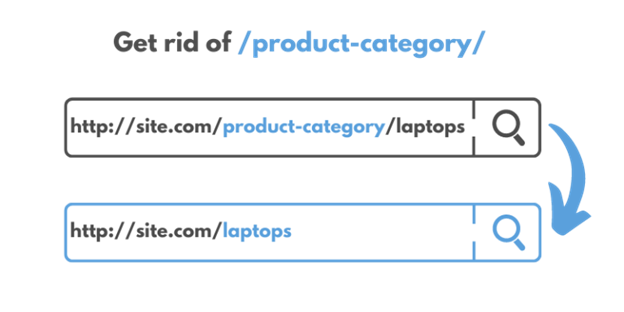
- Use product slug alone or with category
You can set product URLs in two ways:
- yourstore.com/product-name
- yourstore.com/category-name/product-name
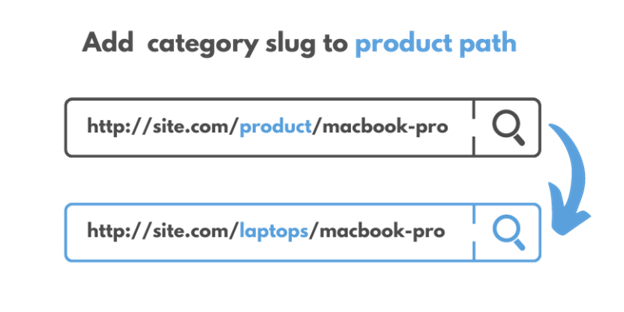
- Add full category path
If you have nested categories, the plugin supports full path URLs. Example:
- yourstore.com/electronics/laptops/laptop-bag
- Add or remove /shop/ base
You can choose to include or remove /shop/ from your product and category URLs. - Use SKU instead of product slug
You can replace the product name in URLs with its SKU. This is helpful for inventory-based stores. Example:
- yourstore.com/1234-sku
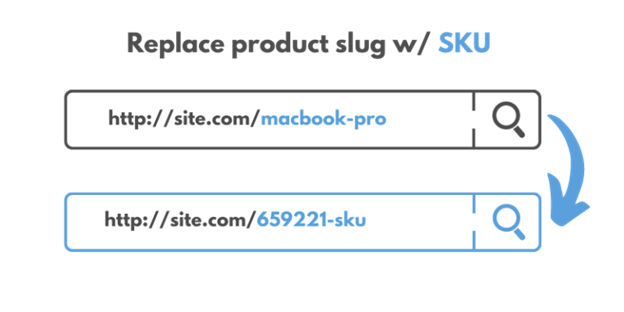
- Add URL endings like .html, .php
Want to match URLs from an old site or CMS? You can add custom extensions like:
- .html, .php, .htm
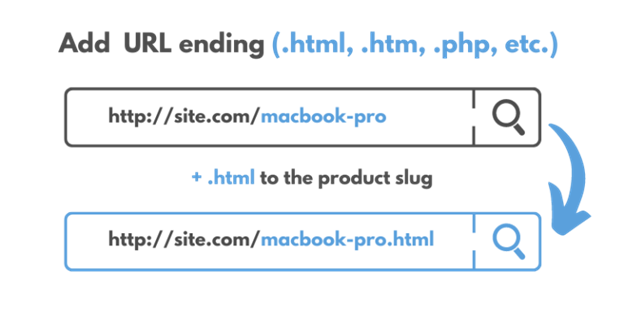
- Product-specific permalink settings
You can customize URLs for specific products without changing the entire store. This is perfect for landing pages and marketing campaigns. - Primary category support
The SEO Framework and Yoast SEO are compatible with the plugin. When a product falls into more than one category, you can select the “primary” category. This helps the URL stay clean and organized.
SEO Optimization Features
The plugin is built with SEO in mind. It includes smart features that help boost your store’s search visibility.
301 Redirects
Old URLs are redirected to the updated ones when you modify the URL for a product or category. This keeps your SEO value and avoids broken links.
Canonical URLs
The plugin gives your pages canonical tags. These tags tell search engines which URL is the main one, helping prevent duplicate content issues.
Sitemap Support
When used with the Yoast SEO plugin, all your new custom URLs are automatically added to your sitemap. This speeds up the process by which search engines locate and index your updated links.
Benefits for WooCommerce Store Owners
Using this plugin brings multiple advantages to your store:
- Boost SEO: Clean URLs help pages rank higher on Google.
- Improve user experience: Short, readable URLs are easier to trust and share.
- Maintain old links: Great for stores migrating from other platforms.
- No coding required: Set everything up from the WooCommerce dashboard.
- Supports multilingual sites: Works well with WPML for translating URLs.
This plugin gives WooCommerce store owners the flexibility they need. It simplifies the process of optimizing URLs, while also protecting SEO value during changes.

Step-by-Step Setup & Configuration Process
It is easy to set up the Custom Permalinks for WooCommerce plugin. Technical expertise or coding experience is not required. To begin, simply follow the instructions below.
Installation & Access
First, buy the plugin from the official WooCommerce marketplace. Install it just like you would any other WooCommerce plugin after downloading it.
- Go to your WordPress dashboard.
- Navigate to Plugins > Add New > Upload Plugin.
- Upload the ZIP file and click “Install Now”.
- Activate the plugin after installation.
Now you’ll see a new option under WooCommerce settings.
- Go to WooCommerce > Settings > Custom Permalinks.
Configuring Product Permalinks
This is where you control how your product URLs appear.
You’ll see multiple options:
- Product slug alone
This removes /product/ from the URL. The product slug appears directly after your domain.
- Example: yourstore.com/laptop-bag
- Product slug with category
This includes the main category in the URL before the product name.
- Example: yourstore.com/accessories/laptop-bag
- Full path with parent and child categories
This builds the full breadcrumb-style URL using all category levels.
- Example: yourstore.com/electronics/laptops/laptop-bag
Choose the one that fits your store layout best. Use the full path if SEO and category structure are your priority.
Configuring Category Permalinks
Next, go to the Category Permalinks section in the same settings area.
Here are your options:
- Category slug alone
Removes /product-category/ and shows just the category name.
- Example: yourstore.com/backpacks
- Full path
Displays the full category hierarchy in the URL.
- Example: yourstore.com/electronics/accessories/backpacks
This is great if you use second-level or nested categories.
Add or Remove /shop/ Base
WooCommerce sometimes adds /shop/ to your URLs by default. With a single click, you can add it back or remove it.
- To remove it, uncheck the “Include /shop/” option.
- To add it, check the same option in plugin settings.
Example:
- Without /shop/: yourstore.com/laptop-bag
- With /shop/: yourstore.com/shop/laptop-bag
This setting applies to both products and categories.
Custom URLs for Specific Products
You can customize URLs for individual products. This is useful for campaigns or SEO testing.
- First, enable “Product specific permalinks” in the plugin’s advanced settings.
- Then, edit any product page.
- You’ll see a new metabox called “Custom Permalink”.
Here, you can write a custom URL for that product. It won’t affect any others.
Use SKU in Product URLs
If you prefer using product SKUs instead of names, the plugin allows it.
- Go to the product settings.
- Choose the option to use SKU instead of the default slug.
Example:
- yourstore.com/48192-sku.html
This helps with inventory tracking and can improve URL consistency.
Set Primary Category (Using Yoast or The SEO Framework)
If a product belongs to many categories, pick one as the primary. The plugin uses this in the permalink.
- First, install Yoast SEO or The SEO Framework.
- Edit the product and scroll to the Categories box.
- Click “Make Primary” next to your chosen category.
The URL will now reflect that structure.
Example:
- yourstore.com/clothing/mens/shirts/polo-shirt
This keeps your URLs clear and focused.
Add URL Endings Like .html or .php
If you want to match old URLs or mimic other CMS formats, you can add endings.
- In plugin settings, enter .html, .php, .htm, or any format.
- Choose where to apply it: products, categories, or both.
Example:
- yourstore.com/laptop-bag.html
This is helpful for SEO consistency after a platform migration.
Enable SEO Settings
Don’t forget to turn on SEO tools included in the plugin.
- Enable 301 redirects to keep old links working.
- Turn on canonical URLs to avoid content duplication.
These features help protect your search rankings when making changes.
When Should You Use This Plugin?
Not every store can use the Custom Permalinks for WooCommerce plugin. But if you care about SEO, branding, or clean URLs, it’s a must-have.
Use this plugin when:
- Your current URLs look long or confusing.
- You want to follow best SEO practices.
- You need to match URLs from an old website.
- You’re migrating from Shopify, Magento, or another CMS.
- You want complete command over the link structure in WooCommerce.
It’s also helpful for stores that have complex categories or multilingual needs.
Practical Use Cases
Let’s look at some real-life examples where this plugin adds value:
- Migration from another platform
You may have URLs that end with .html or follow a different pattern. Instead of losing traffic, you can match those URLs exactly. - SEO optimization
Cleaner URLs help Google understand your pages better. They also look more clickable in search results. - Custom landing pages
Running a campaign? You can create a short, custom URL just for that product. This improves branding and conversion. - Multilingual stores
If you use WPML, you can translate /shop/ or other base segments. This makes your URLs look native for each region.
Avoiding Common Mistakes
Changing URLs can affect SEO if not done right. Always turn on the 301 redirect feature before updating permalinks. This will send users and search engines to the correct new pages.
Turn on canonical URLs as well. This instructs Google on which page version to index. It helps avoid content duplication problems.
If you’re unsure, test changes on a staging site first. Or, before making significant changes to live URLs, seek advice from an SEO specialist.
Conclusion
The Custom Permalinks plugin gives WooCommerce users something powerful—total control. With cleaner, smarter URLs, your store becomes more SEO-friendly and user-focused.
You get:
- Better search performance
- Clearer URLs for users
- Easier link sharing
- Full flexibility, with no coding needed
Whether you’re optimizing or migrating, this plugin saves time and protects your traffic.
Need help setting it up or customizing WooCommerce further?
📞 Call WooHelpDesk at +1 888 602 0119 (US & Canada)— Your trusted support team for WooCommerce and WordPress.
We’re here to help you make Woo work better for your business.

